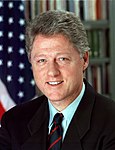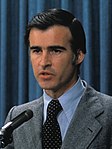
The 1992 United States presidential election was the 52nd quadrennial presidential election, held on Tuesday, November 3, 1992. Democratic Governor Bill Clinton of Arkansas defeated incumbent Republican President George H. W. Bush and independent businessman Ross Perot of Texas. The election marked the end of a period of Republican dominance in American presidential politics that began in 1968,, and also marked the end of 12 years of Republican rule of the White House, as well as the end of the Greatest Generation's 32-year American rule and the beginning of the baby boomers' 28-year dominance until 2020. It was the last time the incumbent president failed to win a second term until Donald Trump in 2020.

Each of the 50 U.S. states, the District of Columbia, and territories of the United States holds either primary elections or caucuses to help nominate individual candidates for president of the United States. This process is designed to choose the candidates that will represent their political parties in the general election.

From January 14 to June 8, 2004, voters of the Democratic Party chose its nominee for president in the 2004 United States presidential election.

Thomas Richard Harkin is an American lawyer, author, and politician who served as a United States senator from Iowa from 1985 to 2015. A member of the Democratic Party, he previously was the U.S. representative for Iowa's 5th congressional district from 1975 to 1985. He is the longest-serving senator to spend the entire tenure as a state's junior senator.

The New Hampshire presidential primary is the first in a series of nationwide party primary elections and the second party contest, the first being the Iowa caucuses, held in the United States every four years as part of the process of choosing the delegates to the Democratic and Republican national conventions which choose the party nominees for the presidential elections to be held in November. Although only a few delegates are chosen in the New Hampshire primary, its real importance comes from the massive media coverage it receives, along with the first caucus in Iowa.
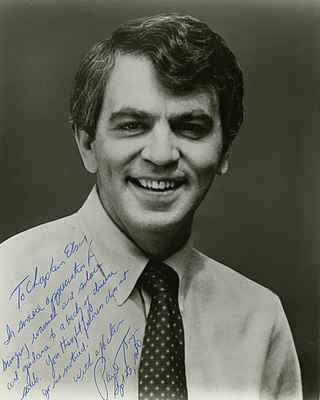
Paul Efthemios Tsongas was an American politician who represented Massachusetts in the United States Senate from 1979 until 1985 and in the United States House of Representatives from 1975 until 1979. A member of the Democratic Party, he ran for president in 1992. He won eight contests during the presidential primaries, but lost the nomination to Bill Clinton, who later won the general election. Born in Lowell, Massachusetts, Tsongas graduated from Dartmouth College, Yale Law School and the Kennedy School of Government. After working for the Peace Corps and as an aide to Congressman F. Bradford Morse, Tsongas successively won election as a city councilor and county commissioner.

From February 10 to June 9, 1992, voters of the Democratic Party chose its nominee for president in the 1992 United States presidential election. Arkansas Governor Bill Clinton won the nomination through a series of primary elections and caucuses culminating in the 1992 Democratic National Convention held from July 13 to July 16, 1992, in New York City.

The 1992 presidential campaign of Bill Clinton, the then-governor of Arkansas, was announced on October 3, 1991, at the Old State House in Little Rock, Arkansas. After winning a majority of delegates in the Democratic primaries of 1992, the campaign announced that then-junior U.S. senator from Tennessee, Al Gore, would be Clinton's running mate. The Clinton–Gore ticket defeated Republican incumbent President George H. W. Bush and Vice President Dan Quayle in the presidential election on November 3, 1992, and took office as the 42nd president and 45th vice president, respectively, on January 20, 1993.
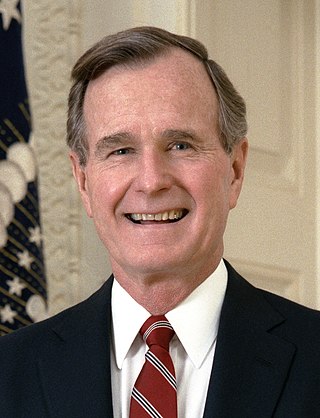
Presidential primaries and caucuses of the Republican Party took place within all 50 U.S. states and the District of Columbia between February 18 to June 9, 1992. These elections were designed to select the 2,277 delegates to send to the national convention in Houston, Texas from August 17 to August 20, 1992, who selected the Republican Party's nominee for president in the 1992 United States presidential election, incumbent president George H. W. Bush. The delegates also approved the party platform and vice-presidential nominee. Bush went on to lose the general election to the Democratic nominee, Governor Bill Clinton.

The 2008 New Hampshire Democratic presidential primary on January 8, 2008 was the first primary in the United States in 2008. Its purpose was to determine the number of delegates from New Hampshire that would represent a certain candidate at the National Convention. In a primary, members of a political party—in this case, the Democratic Party—will select the candidates to a subsequent election. Since 1920, New Hampshire has always hosted the first primaries in the entire nation. The Democratic Party's primary occurred on the same day as the Republican primary.
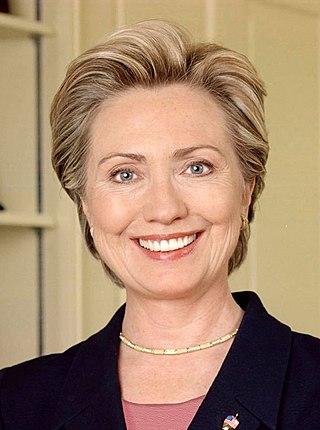
The 2008 Michigan Democratic presidential primary took place January 15, 2008. Originally, the state had 156 delegates up for grabs that were to be awarded in the following way: 83 delegates were to be awarded based on the winner in each of Michigan's 15 congressional districts while an additional 45 delegates were to be awarded to the statewide winner. Twenty-eight unpledged delegates, known as superdelegates, were initially able to cast their votes at the Democratic National Convention in Denver, Colorado.

The South Carolina presidential primary is an open primary election which has become one of several key early-state presidential primaries in the process of the Democratic and Republican Parties choosing their respective general election nominees for President of the United States. South Carolina has cemented its place as the "First in the South" primary for both parties.

From January 24 to June 6, 2000, voters of the Democratic Party chose its nominee for president in the 2000 United States presidential election. Incumbent Vice President Al Gore was selected as the nominee through a series of primary elections and caucuses culminating in the 2000 Democratic National Convention held from August 14 to 17, 2000, in Los Angeles, California, but he went on to lose the Electoral College in the general election against Governor George W. Bush held on November 7 of that year, despite winning the popular vote by 0.5%.

The 2004 presidential campaign of Howard Dean, 79th Governor of Vermont, began when he formed an exploratory committee to evaluate a presidential election campaign on May 31, 2002. Dean then formally announced his intention to compete in the 2004 Democratic primaries to seek the Democratic Party's nomination for President on June 23, 2003. Dean dropped out of the race in February 2004 after a poor showing in the Wisconsin primary.
Bill Clinton served as the 42nd president of the United States (1993–2001) and as the 40th and 42nd governor of Arkansas. A member of the Democratic Party, Clinton first ran for a public office in 1974, competing in the congressional election for Arkansas's 3rd congressional district. After narrowly losing to incumbent representative John Paul Hammerschmidt, he ran for the office of Arkansas Attorney General in 1976. He won the Democratic primary comfortably, receiving over 55% of the popular vote. Witnessing his strong support during the primaries, Republicans did not nominate a candidate to run against him. Clinton won the general election unopposed. His experience as the attorney general was considered a natural "stepping-stone" to the governorship.

The 2008 United States presidential election in New Hampshire took place on November 4, 2008, as part of the 2008 United States presidential election throughout all 50 states and D.C. Voters chose four representatives, or electors to the Electoral College, who voted for president and vice president.

The 1992 United States presidential election in Iowa took place on November 3, 1992, as part of the 1992 United States presidential election. Voters chose seven representatives, or electors to the Electoral College, who voted for president and vice president.
Since 1983, the Democratic Party of the United States holds a few debates between candidates for the Democratic nomination in presidential elections during the primary election season. Unlike debates between party-nominated candidates, which have been organized by the bi-partisan Commission on Presidential Debates since 1988, debates between candidates for party nomination are organized by mass media outlets.

This article lists those who were potential candidates for the Democratic nomination for Vice President of the United States in the 2000 election. Incumbent Vice President Al Gore won the 2000 Democratic nomination for President of the United States, and chose Connecticut Senator Joseph Lieberman as his running mate on August 7, 2000. Lieberman, a centrist two-term Democratic senator, was chosen for being "tough on defense" and foreign policy issues. Lieberman was the first Jewish nominee chosen for a national ticket. The choice of Lieberman was announced shortly before the 2000 Democratic National Convention. Former Secretary of State Warren Christopher led the vetting process. The Gore–Lieberman ticket ultimately lost to the Bush–Cheney ticket. Coincidental to the presidential election, Lieberman was re-elected to a third term as senator from Connecticut.
The 1992 presidential campaign of Tom Harkin, a U.S. Senator from Iowa, began with a campaign rally on September 15, 1991. Harkin had first been elected to a national office in 1974 as a member of the House of Representatives, serving from 1975 to 1985, when he became a senator. A member of the Democratic Party, Harkin established himself as a populist liberal, supporting New Deal-style policies while receiving broad support from organized labor and left-leaning voters. Harkin was very critical of then-President George H. W. Bush, a conservative Republican, and positioned himself as the most liberal candidate in the Democratic field. His policy positions included support for a national health insurance system, cuts to military funding, and increased funding for infrastructure.


